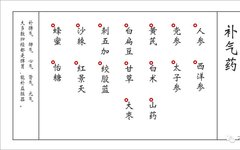Tonifying Herbs
Herbs that primarily function to strengthen the weak and correct deficiencies in the body’s Qi, blood, Yin, and Yang are known as tonifying herbs, also referred to as replenishing or nourishing herbs.
This category of herbs can assist the righteous Qi and replenish the essence, based on the theory that “sweet can tonify”.
(1) Qi Tonifying Herbs
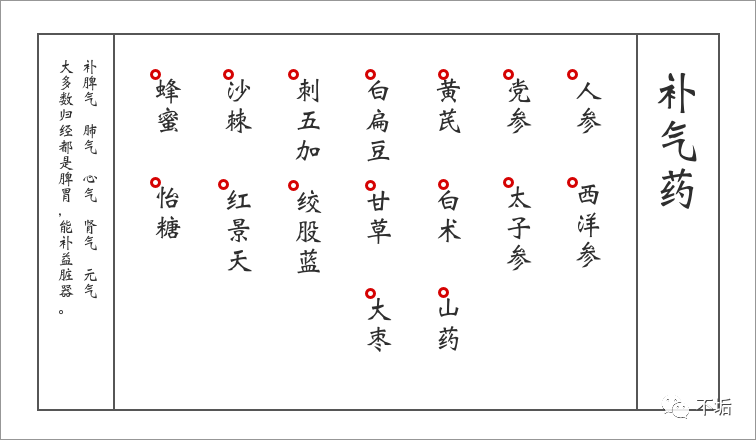
Tonifying the Spleen Qi / Lung Qi / Heart Qi / Kidney Qi / Yuan Qi
Most of these herbs are associated with the Spleen and Stomach.
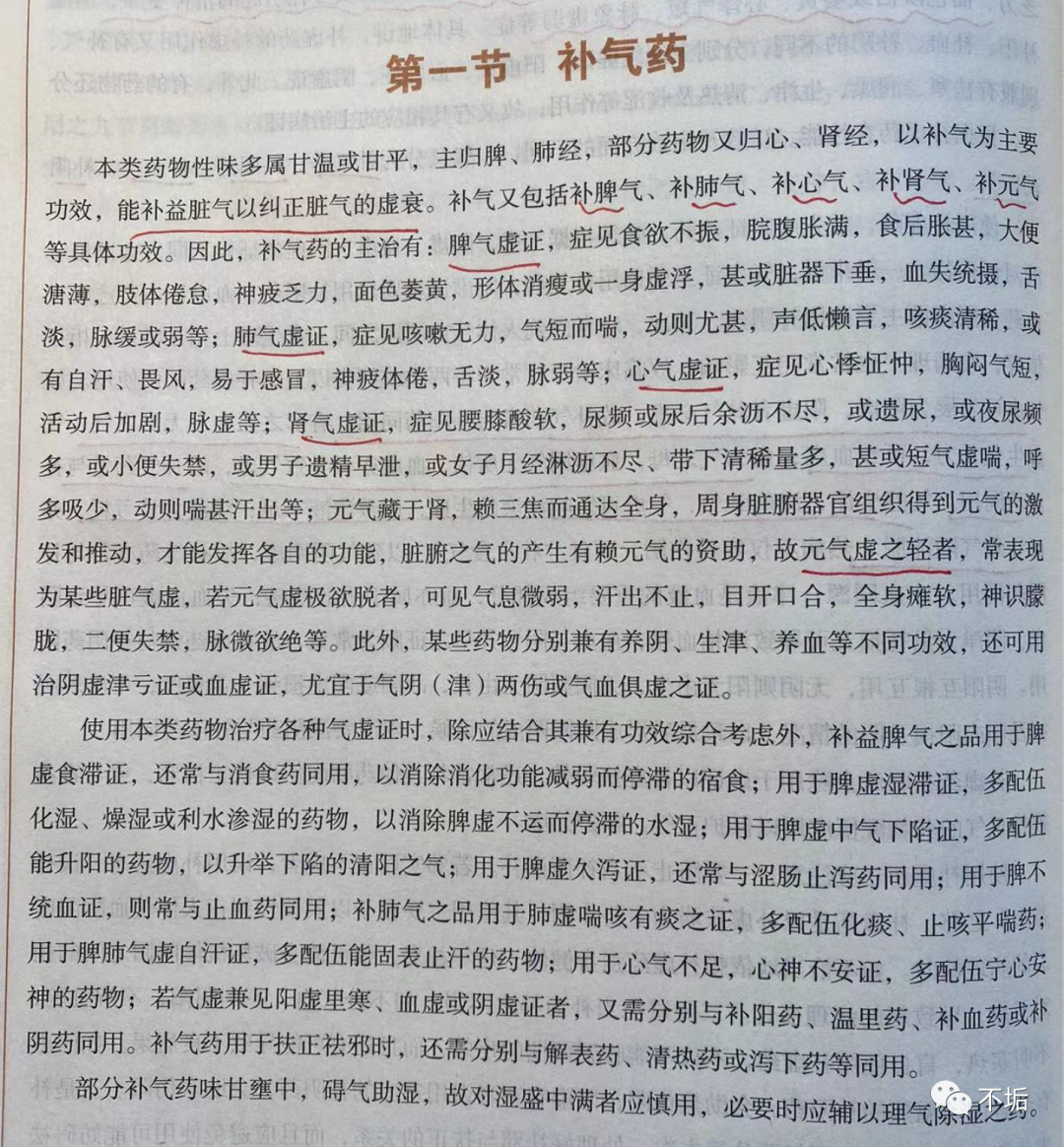
Ren Shen (Ginseng)
Properties: Warm in nature, sweet, slightly bitter, slightly warm.
Meridians: Spleen, Lung, Heart, Kidney.
Indications: Tonifies Yuan Qi, restores pulse, strengthens Spleen and benefits Lung, generates fluids, calms the spirit. Used for deficiency of the body leading to collapse, cold limbs, weak pulse, Spleen deficiency with poor appetite, Lung deficiency with cough and wheezing, and fluid damage causing thirst.
Si Jun Zi Tang (Four Gentlemen Decoction): Ren Shen, Bai Zhu (White Atractylodes), Fu Ling (Poria), Gan Cao (Licorice). 【A tonic formula that tonifies Qi, benefits Qi, and strengthens the Spleen】
Tian Wang Bu Xin Dan (Heavenly Emperor Heart-Supplementing Pill): Ren Shen, Fu Ling, Xuan Shen (Scrophularia), Dan Shen (Salvia), Jie Geng (Platycodon), Yuan Zhi (Polygala), Dang Gui (Angelica), Wu Wei Zi (Schisandra), Mai Men Dong (Ophiopogon), Tian Men Dong (Asparagus), Bai Zi Ren (Platycladus), Suan Zao Ren (Sour Jujube Seed), Sheng Di Huang (Rehmannia). 【A calming formula that nourishes Yin, clears heat, and nourishes blood to calm the spirit】
Ba Zhen Tang (Eight Treasures Decoction): Ren Shen, Bai Zhu, Bai Fu Ling (White Poria), Dang Gui, Chuan Xiong (Ligusticum), Bai Shao (White Peony), Shu Di Huang (Rehmannia), Gan Cao. 【Has the effect of benefiting Qi and nourishing blood. Indicated for Qi and blood deficiency】
Xi Yang Shen (American Ginseng)
Properties: Cool in nature, sweet, slightly bitter.
Meridians: Heart, Lung, Kidney.
Functions: Tonifies Qi, nourishes Yin, clears heat, and generates fluids. A type of Qi tonifying herb.
【Compared to Ren Shen, it has a slightly weaker Qi tonifying effect but is more suitable for nourishing Yin and clearing heat, suitable for both Qi and Yin deficiency】
Dang Shen (Codonopsis)
Properties: Sweet, neutral.
Meridians: Spleen, Lung.
Functions: Tonifies the middle, benefits Qi, generates fluids. Used for Spleen and Stomach deficiency, Qi and blood deficiency, fatigue, poor appetite, thirst, chronic diarrhea, and prolapse of the rectum.
【Tonifies the Qi of the middle Jiao】
Tai Zi Shen (Pseudostellaria)
Properties: Sweet, slightly bitter; neutral.
Meridians: Spleen, Lung.
Functions: Benefits Qi, strengthens the Spleen, generates fluids, moistens the Lung.
Indications: Used for Spleen deficiency with fatigue, poor appetite, post-illness weakness, insufficient Qi and Yin, spontaneous sweating, thirst, dry cough due to Lung dryness.
【Suitable for children, does not cause precocious puberty】
Huang Qi (Astragalus)
Properties: Sweet, slightly warm;
Meridians: Spleen, Lung.
Functions: Tonifies Qi, stabilizes the exterior, expels toxins, promotes tissue regeneration, diuretic. Used for Qi deficiency and fatigue, chronic diarrhea, prolapse, spontaneous sweating, edema, uterine prolapse, chronic nephritis with proteinuria, diabetes, and non-healing sores.
【Suitable for Spleen Qi deficiency and sinking of the middle Qi】
Bu Zhong Yi Qi Tang (Tonify the Middle and Benefit Qi Decoction): Huang Qi, Bai Zhu, Chen Pi (Aged Tangerine Peel), Sheng Ma (Cimicifuga), Chai Hu (Bupleurum), Ren Shen, Gan Cao, Dang Gui.
Yu Ping Feng San (Jade Windscreen Powder): Fang Feng (Siler), Huang Qi, Bai Zhu. 【Has the effect of benefiting Qi and stabilizing the exterior to stop sweating. Indicated for exterior deficiency with spontaneous sweating】

Bai Zhu (Atractylodes)
Properties: Bitter, sweet, warm; Meridians: Spleen, Stomach.
Functions: Tonifies Qi, strengthens the Spleen, dries dampness, promotes urination, stops sweating, calms the fetus.
Indications: Used for Spleen Qi deficiency, poor appetite, loose stools, phlegm-dampness with edema, exterior deficiency with spontaneous sweating, and unstable fetal movement.
【”The primary herb for tonifying the Spleen and strengthening Qi”】
Si Jun Zi Tang (Four Gentlemen Decoction): Ren Shen, Bai Zhu, Fu Ling, Gan Cao.
Shen Ling Bai Zhu San (Ginseng, Poria, and Atractylodes Powder): Bai Bian Dou (Lima Bean), Bai Zhu, Fu Ling, Gan Cao, Jie Geng, Lian Zi (Lotus Seed), Ren Shen, Sha Ren (Amomum), Shan Yao (Chinese Yam), Yi Yi Ren (Job’s Tears).
Ps: The difference between Bai Zhu and Cang Zhu
Bai Zhu is stable and does not disperse, while Cang Zhu disperses and does not stabilize. Therefore, Bai Zhu is good for tonifying, while Cang Zhu is good for moving. Both can aid digestion and stop vomiting, but Cang Zhu excels at draining dampness and relieving stagnation.
Shan Yao (Chinese Yam)
Properties: Sweet, neutral.
Meridians: Lung, Spleen, Kidney.
Functions: Strengthens the Spleen, tonifies the Lung, stabilizes the Kidney, benefits essence. Used for Spleen deficiency with diarrhea, chronic dysentery, deficiency cough, thirst, nocturnal emissions, leukorrhea, and frequent urination. Roasted Shan Yao tonifies the Spleen and strengthens the Stomach. Used for Spleen deficiency with poor appetite, diarrhea, and excessive leukorrhea.
【Suitable for both Qi and Yin deficiency, can be used as food and medicine】
Bai Bian Dou (Lima Bean)
Properties: Slightly warm, sweet.
Meridians: Spleen, Stomach.
Functions: Strengthens the Spleen, transforms dampness, harmonizes the middle, and relieves summer heat. A type of Qi tonifying herb.
Shen Ling Bai Zhu San (Ginseng, Poria, and Atractylodes Powder): Bai Bian Dou, Bai Zhu, Fu Ling, Gan Cao, Jie Geng, Lian Zi, Ren Shen, Sha Ren, Shan Yao, Yi Yi Ren.
Gan Cao (Licorice)
Properties: Sweet, neutral.
Meridians: Heart, Lung, Spleen, Stomach.
Functions: Tonifies the Spleen, benefits Qi, clears heat and detoxifies, expels phlegm and stops cough, alleviates pain, harmonizes other herbs.
Indications: Used for Spleen and Stomach deficiency, fatigue, palpitations, cough with phlegm, abdominal and limb pain, carbuncles, and to alleviate toxicity and severity of other herbs.
Zhi Gan Cao Tang (Honey-Fried Licorice Decoction): Gan Cao, Sheng Jiang (Fresh Ginger), Gui Zhi (Cinnamon Twig), Ren Shen, Sheng Di Huang, E Jiao (Donkey-hide Gelatin), Mai Men Dong, Ma Ren, Da Zao (Jujube). 【Indicated for deficiency of Yin blood and Yang Qi, and nourishing the heart pulse】
Gan Cao can detoxify and harmonize the properties of other herbs
Da Zao (Jujube)
Properties: Warm, sweet.
Meridians: Spleen, Stomach, Heart.
Functions: Tonifies the middle, benefits Qi, nourishes blood, calms the spirit. A type of Qi tonifying herb.
【Tonifies the Spleen and calms the spirit】
Gan Mai Da Zao Tang (Licorice, Wheat, and Jujube Decoction): Gan Cao, Xiao Mai (Wheat), Da Zao. 【Nourishes the heart, calms the spirit, harmonizes the middle, and alleviates urgency】
Honey
Properties: Sweet, neutral.
Meridians: Spleen, Lung.
Functions: Tonifies the middle, moistens dryness, alleviates pain, detoxifies.
Indications: Used for dry cough due to Lung dryness, constipation due to dryness, stomach pain, nasal congestion, mouth sores, burns, and to detoxify Aconite poisoning.
(2) Yang Tonifying Herbs
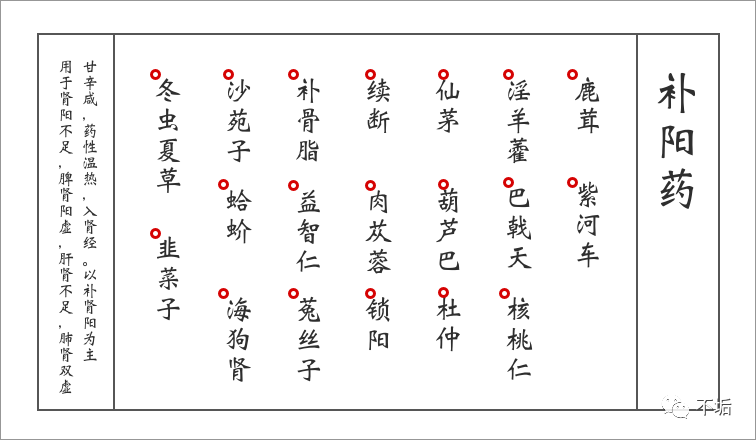
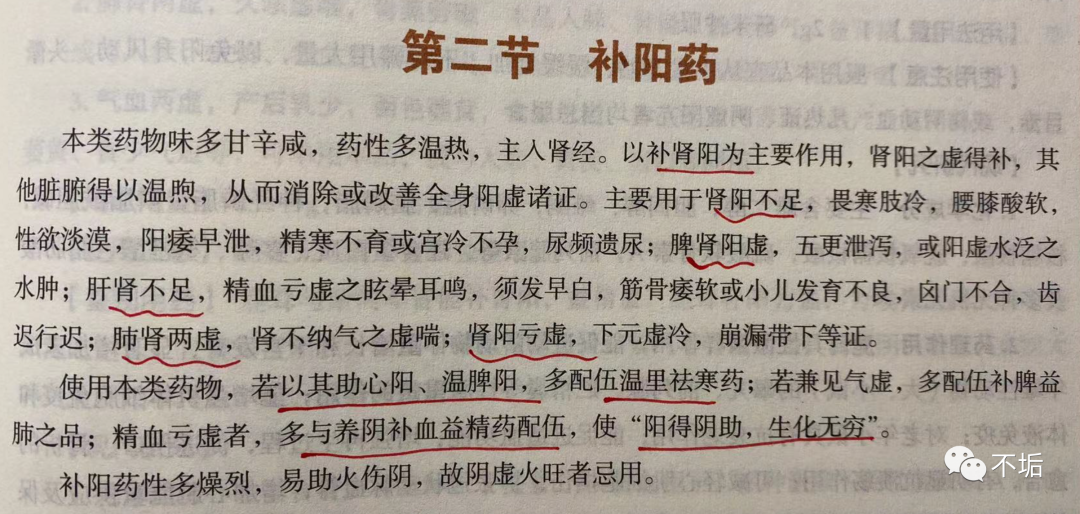
Lu Rong (Deer Antler Velvet)
Properties: Sweet, salty, warm.
Meridians: Liver, Kidney.
Functions: Strengthens Yang, tonifies Qi and blood, benefits essence, strengthens tendons and bones. Used for deficiency of Yang leading to weakness, fatigue, dizziness, deafness, dim vision, soreness of the lower back and knees, impotence, nocturnal emissions; uterine coldness, metrorrhagia, leukorrhea.
Ba Ji Tian (Morinda Root)
Properties: Sweet, spicy, slightly warm.
Meridians: Kidney, Liver.
Functions: Tonifies Kidney Yang, strengthens tendons and bones, dispels wind-dampness.
Indications: Used for impotence, nocturnal emissions, infertility due to uterine cold, irregular menstruation, lower abdominal pain, wind-dampness pain, and weakness of tendons and bones.
Yin Yang Huo (Epimedium)
Properties: Spicy, sweet, warm.
Meridians: Liver, Kidney.
Functions: Tonifies Kidney, strengthens Yang, dispels wind and dampness. Used for impotence, frequent urination, muscle spasms, hemiplegia, weakness of the lower back and knees, wind-dampness pain, and numbness of the limbs.
【Strong warming and drying properties, needs to be combined with herbs that tonify essence】
Xian Mao (Curculigo)
Properties: Spicy, hot, toxic.
Meridians: Kidney.
Functions: Warms the Kidney, strengthens Yang, dispels cold and dampness.
Indications: Used for impotence, coldness of the lower back, frequent urination, and wind-cold-dampness pain.
Bu Gu Zhi (Psoralea)
Properties: Bitter, spicy, very warm.
Meridians: Kidney, Spleen.
Functions: Tonifies Kidney Yang, stabilizes essence and urine, warms the Spleen, stops diarrhea. Used for Yang deficiency of the Kidney, cold pain in the lower back and knees, nocturnal emissions, frequent urination, and morning diarrhea.
【Generally used for Kidney Yang deficiency, unstable Kidney Qi, and Yang deficiency with cough and phlegm. Yang tonifying herbs + astringent herbs】
Yi Zhi Ren (Alpinia Oxyphylla)
Properties: Spicy, warm.
Meridians: Spleen, Kidney.
Functions: Warms the Spleen, stops diarrhea, retains saliva, warms the Kidney, stabilizes essence. Used for cold deficiency of the Spleen and Stomach, vomiting, diarrhea, abdominal cold pain, excessive salivation, Kidney deficiency with nocturnal emissions, frequent urination, and leukorrhea.
【Warming effect similar to Sha Ren and Cardamom. Astringent herb】
Tu Si Zi (Cuscuta Seed)
Properties: Spicy, sweet, neutral.
Meridians: Liver, Kidney, Spleen.
Functions: Tonifies the Liver and Kidney, stabilizes essence and urine, calms the fetus, brightens the eyes, stops diarrhea; can be used externally to dispel wind and remove spots.
【Tonifies Kidney essence and Yang. Dual tonification of Spleen and Kidney, with astringent properties, can also brighten the eyes】
Sha Yuan Zi (Astragalus Seed)
Properties: Warm, sweet.
Meridians: Liver, Kidney.
Functions: Warms and tonifies the Liver and Kidney, stabilizes essence, reduces urination, and brightens the eyes. A type of Yang tonifying herb.
Rou Cong Rong (Cistanches)
Properties: Warm, sweet, salty.
Meridians: Kidney, Large Intestine.
Functions: Tonifies Kidney Yang, benefits essence and blood, moistens the intestines and promotes bowel movements. A type of Yang tonifying herb.
Suo Yang (Cynomorium)
Properties: Sweet; warm.
Meridians: Liver, Kidney, Large Intestine.
Functions: Tonifies Kidney Yang, benefits essence and blood, moistens the intestines and promotes bowel movements.
Indications: Used for insufficient Kidney Yang, deficiency of essence and blood, weakness of the lower back and knees, impotence, nocturnal emissions, and constipation.
Du Zhong (Eucommia Bark)
Properties: Sweet, slightly spicy, warm.
Meridians: Liver, Kidney.
Functions: Tonifies Liver and Kidney, strengthens tendons and bones, alleviates pain, calms the fetus.
Indications: Used for soreness and pain in the lower back and spine, weakness of the legs and knees, residual dribbling of urine, damp-heat itching, threatened miscarriage, and unstable fetal movement, hypertension.
【Tonifies Kidney Yang, treats Kidney deficiency and back pain】
Xu Duan (Dipsacus)
Properties: Slightly warm, bitter, spicy.
Meridians: Liver, Kidney.
Functions: Tonifies Liver and Kidney, strengthens tendons and bones, promotes healing of fractures, stops metrorrhagia.
【Strengthens tendons and bones, promotes healing of fractures】
Ge Jie (Gecko)
Properties: Neutral, salty.
Meridians: Lung, Kidney.
Functions: Tonifies Lung and Kidney, retains Qi, calms asthma, assists in benefiting essence. A type of Yang tonifying herb.
【Suitable for cough and asthma due to both Lung and Kidney deficiency】
Dong Chong Xia Cao (Cordyceps)
Properties: Sweet, neutral.
Meridians: Lung, Kidney.
Functions: Tonifies Kidney and benefits Lung, stops bleeding and transforms phlegm.
Indications: 1. Impotence and nocturnal emissions, soreness and pain in the lower back and knees: this herb tonifies the Kidney and benefits essence, has the effect of invigorating Yang and treating impotence due to Kidney Yang deficiency and essence deficiency.
2. Chronic cough with phlegm and blood: this herb is sweet and neutral, making it an excellent choice for tonifying both Lung and Kidney.
【Cordyceps duck treats pulmonary tuberculosis and Lung Yin deficiency】
Zi He Che (Placenta)
Properties: Sweet, salty, warm.
Meridians: Lung, Liver, Kidney.
Functions: Tonifies Qi, nourishes blood, benefits essence.
Indications: Used for deficiency, emaciation, feverish bone steaming, cough and wheezing, hemoptysis, night sweats, nocturnal emissions, impotence, and insufficient blood and Qi in women, infertility or insufficient lactation.
He Tao Ren (Walnut Kernel)
Properties: Warm, sweet.
Meridians: Kidney, Lung, Large Intestine.
Functions: Warms and tonifies Lung and Kidney, calms asthma, transforms phlegm, moistens the intestines and astringes essence.
Indications: Used for weakness and soreness in the lower back and knees, cold asthma, nocturnal emissions, and constipation.
(3) Blood Tonifying Herbs
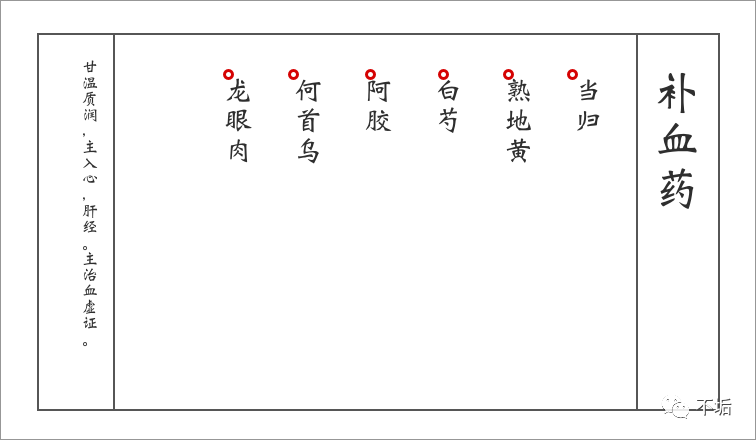
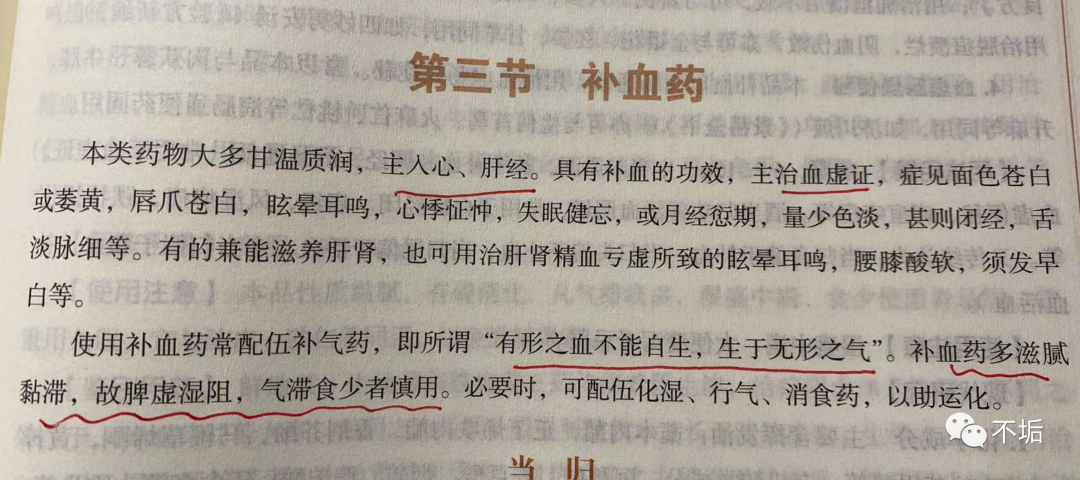
Dang Gui (Angelica)
Properties: Sweet, spicy, warm.
Meridians: Liver, Heart, Spleen.
Functions: Tonifies blood; invigorates blood; regulates menstruation and alleviates pain; moistens dryness and promotes bowel movements.
Indications: Used for blood deficiency syndromes; irregular menstruation; amenorrhea; dysmenorrhea; abdominal masses; metrorrhagia; cold abdominal pain; numbness of the skin; constipation; post-hemorrhage fatigue; carbuncles and sores; trauma.
Si Wu Tang (Four Substance Decoction): Dang Gui, Chuan Xiong, Bai Shao, Shu Di Huang 【Tonifies blood and regulates menstruation】
Xiao Yao San (Free and Easy Wanderer Powder): Chai Hu, Dang Gui, Bai Shao, Bo He (Mint), Fu Ling, Bai Zhu, Gan Jiang, Da Zao, Di Huang. 【Soothes the Liver, relieves depression, nourishes blood, and strengthens the Spleen】
【Most suitable for blood deficiency with cold stagnation and pain, both tonifies blood and invigorates blood (similar to Ji Xue Teng)
Shu Di Huang (Rehmannia)
Properties: Sweet, slightly warm.
Meridians: Liver, Kidney.
Functions: Nourishes Yin, tonifies blood.
Indications: Used for Yin deficiency with blood loss, weakness of the lower back and knees, feverish bone steaming, nocturnal emissions, metrorrhagia, irregular menstruation, thirst, frequent urination, tinnitus, and dim vision.
【Tonifies blood, nourishes Yin, benefits essence, suitable for both essence and blood deficiency】
Shen Qi Wan (Kidney Qi Pill): Gan Di Huang, Shan Yao, Shan Zhu Yu (Cornus), Ze Xie (Alisma), Fu Ling, Mu Dan Pi (Moutan), Gui Zhi, Fu Zi (Aconite).
You Gui Wan (Right Return Pill)
Zuò Guī Wán (Left Return Pill)
Zhi Bai Di Huang Wan (Anemarrhena and Rehmannia Pill)
Liù Wèi Dì Huáng Wán (Six Flavor Rehmannia Pill)
Bai Shao (White Peony)
Properties: Bitter, sour, slightly cold.
Meridians: Liver, Spleen.
Functions: Nourishes blood, astringes Yin, softens the Liver, alleviates pain, calms Liver Yang, stops sweating.
Indications: Used for irregular menstruation, metrorrhagia, spontaneous sweating, abdominal pain, rib pain, limb pain, headache, and dizziness.
【Most widely used for calming the Liver, astringing Yin, and alleviating pain. Not suitable for Yang deficiency with spontaneous sweating】
He Shou Wu (Fo-Ti)
Properties: Bitter, sweet, astringent, slightly warm;
Meridians: Liver, Kidney.
Functions: Prepared: Tonifies essence and blood; Raw: Detoxifies, stops malaria, moistens the intestines and promotes bowel movements.
Indications: 1. Essence and blood deficiency, dizziness, premature graying of hair, weakness of the lower back and knees: prepared He Shou Wu is good for tonifying the Liver and Kidney, benefiting essence and blood, and darkening hair.
2. Chronic malaria, carbuncles, lymphadenitis, constipation: raw He Shou Wu has the effect of stopping malaria, detoxifying, and moistening the intestines.
【Used for deficiency of Kidney essence, commonly used for anti-aging】
E Jiao (Donkey-hide Gelatin)
Properties: Sweet, neutral;
Meridians: Lung, Liver, Kidney.
Functions: Tonifies blood, nourishes Yin, moistens the Lung, stops bleeding.
【Tonifies blood, stops bleeding, especially suitable for bleeding with blood deficiency】
Long Yan Rou (Longan Flesh)
Properties: Sweet, warm.
Meridians: Heart, Spleen.
Functions: Benefits the Heart and Spleen, nourishes blood, calms the spirit.
Indications: Used for Qi and blood deficiency, palpitations, forgetfulness, insomnia, and blood deficiency with sallow complexion.
【Gui Pi Tang (Restore the Spleen Decoction): Bai Zhu, Ren Shen, Huang Qi, Dang Gui, Gan Cao, Bai Fu Ling, Yuan Zhi, Suan Zao Ren, Mu Xiang, Long Yan Rou, Sheng Jiang, Da Zao.】
(4) Yin Tonifying Herbs
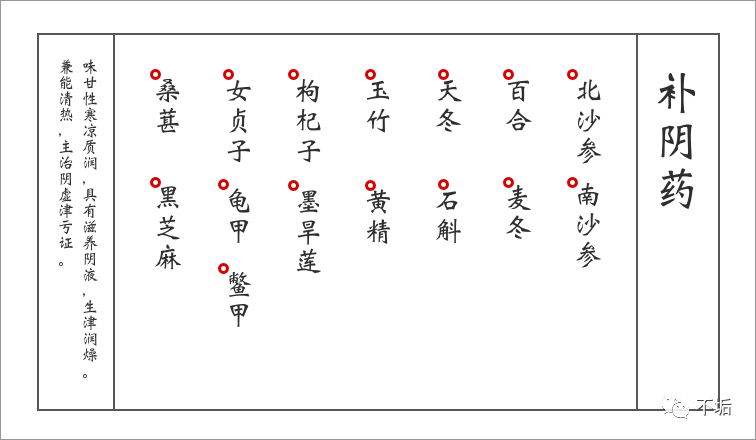
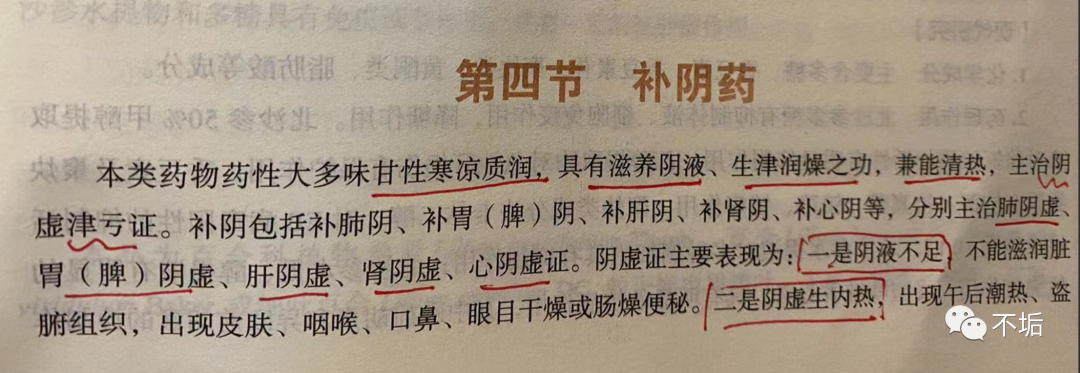
“For those with Yin deficiency, one must tonify while also clearing”
Bei Sha Shen (North American Ginseng)
Properties: Sweet, bitter, bland, cool.
Meridians: Lung, Spleen.
Functions: Nourishes Yin, clears the Lung, transforms phlegm, and stops cough.
Indications: Used for dry cough due to Lung heat, chronic cough due to deficiency, and dryness of the throat and mouth due to Yin injury.
Nan Sha Shen (South American Ginseng)
Properties: Sweet, slightly cold.
Meridians: Lung, Stomach.
Functions: Nourishes Yin, clears the Lung, benefits the Stomach, generates fluids, transforms phlegm, and benefits Qi.
Indications: Used for dry cough due to Lung heat, Yin deficiency with cough, dry cough with sticky phlegm, Stomach Yin deficiency with poor appetite and vomiting, Qi and Yin deficiency with irritability and dry mouth.
【Yin deficiency of the Lung with Qi deficiency, tonifies Qi and transforms phlegm】
Yu Zhu (Polygonatum)
Properties: Sweet, slightly cold.
Meridians: Lung, Stomach.
Functions: Nourishes Yin, moistens dryness, generates fluids, and stops thirst.
Indications: Used for Lung and Stomach Yin deficiency, dry cough, dry throat, and internal heat with thirst.
【Suitable for Yin deficiency with external pathogens】
Mai Dong (Ophiopogon)
Properties: Sweet, slightly bitter, slightly cold. Meridians: Heart, Lung, Stomach.
Functions: Nourishes Yin, generates fluids, moistens the Lung, and stops cough. Indications: Used for Lung and Stomach Yin deficiency with insufficient fluids, dry cough with blood, palpitations due to Heart Yin deficiency, and heat injury to fluids after febrile diseases. Combined with Sha Shen and Chuan Bei can treat dry cough due to Lung Yin deficiency.
【Strong Yin nourishing effect, benefits the throat】
Tian Dong (Asparagus)
Properties: Sweet, bitter, cold.
Meridians: Lung, Kidney.
Functions: Nourishes Yin, moistens dryness, clears the Lung, and generates fluids.
Indications: Used for dry cough due to Lung dryness, sticky phlegm, soreness in the lower back and knees, feverish bone steaming, internal heat with thirst, and constipation due to dryness.
Shi Hu (Dendrobium)
Properties: Sweet, slightly cold.
Meridians: Stomach, Kidney.
Functions: Benefits the Stomach, generates fluids, nourishes Yin, and clears heat.
Indications: Used for heat injury to fluids, dry mouth and thirst, insufficient Stomach Yin, poor appetite, dry vomiting, and post-illness heat that does not subside, Yin deficiency with excess heat, and weakness of the muscles and bones.
Bai He (Lily Bulb)
Properties: Sweet, cold.
Meridians: Heart, Lung.
Functions: Nourishes Yin, moistens the Lung, calms the spirit. Indications: Used for dry cough due to Yin deficiency, chronic cough with blood, irritability, insomnia, and mental confusion.
Huang Jing (Polygonatum)
Properties: Sweet, neutral.
Meridians: Spleen, Lung, Kidney.
Functions: Tonifies Qi, nourishes Yin, strengthens the Spleen, moistens the Lung, and benefits the Kidney.
Indications: Used for Spleen Qi deficiency, fatigue, insufficient Stomach Yin, dry mouth, poor appetite, Lung deficiency with dry cough, chronic cough with blood, insufficient essence and blood, weakness, premature graying of hair, and internal heat with thirst.
【Tonifies Qi, nourishes Yin, treats Spleen, Lung, and Kidney, but can be overly moistening and lacks the astringent properties of Shan Yao】
Gou Qi Zi (Goji Berries)
Properties: Sweet, neutral.
Meridians: Liver, Kidney.
Functions: Nourishes the Kidney, moistens the Lung, benefits the Liver, and brightens the eyes. Indications: Used for Liver and Kidney Yin deficiency, weakness in the lower back and knees, dizziness, dim vision, chronic cough, thirst, and nocturnal emissions.
【Used for blood deficiency, anti-aging】
Mo Han Lian (Eclipta)
Properties: Sweet, sour, cool.
Meridians: Liver, Kidney.
Functions: Cools the blood, stops bleeding, nourishes the Kidney, and benefits Yin. Indications: Used for hemoptysis, epistaxis, hematuria, blood dysentery, traumatic bleeding, premature graying of hair, white throat, dampness, and itching in the genital area.
Nv Zhen Zi (Ligustrum)
Properties: Neutral, sweet, bitter.
Meridians: Liver, Kidney.
Functions: Nourishes Yin, prolongs life, benefits the Liver and Kidney, clears heat, and brightens the eyes. Indications: Used for dizziness, tinnitus, dim vision, weakness in the lower back and knees, internal heat, and premature graying of hair.
Gui Jiao (Tortoise Shell)
Properties: Salty, sweet, slightly cold.
Meridians: Liver, Kidney, Heart.
Functions: Nourishes Yin, subdues Yang, benefits the Kidney, strengthens bones, nourishes blood, and stabilizes menstruation. Indications: Used for Yin deficiency with tidal fever, bone steaming, dizziness, internal wind, weakness in the muscles and bones, forgetfulness, and metrorrhagia.
Bei Jiao (Soft-shelled Turtle Shell)
Properties: Slightly cold, salty. Meridians: Liver, Kidney.
Functions: Nourishes Yin, subdues Yang, softens hardness, disperses heat. A type of Yin tonifying herb.
Indications: Used for Yin deficiency with fever, bone steaming, internal wind, amenorrhea, and abdominal masses.
Sang Shen (Mulberry Fruit)
Properties: Cold, sweet, sour. Meridians: Heart, Liver, Kidney.
Functions: Tonifies blood, nourishes Yin, generates fluids, and moistens dryness. Indications: Used for dizziness, tinnitus, palpitations, insomnia, premature graying of hair, thirst, and constipation due to blood deficiency.
Hei Zhi Ma (Black Sesame)
Properties: Neutral, sweet. Meridians: Liver, Kidney, Large Intestine.
Functions: Nourishes the Liver and Kidney, benefits essence and blood, moistens the intestines and alleviates dryness. Indications: Used for dizziness, tinnitus, premature graying of hair, post-illness hair loss, constipation, deficiency of Liver and Kidney, wind-dampness, paralysis, and insufficient lactation in women.

